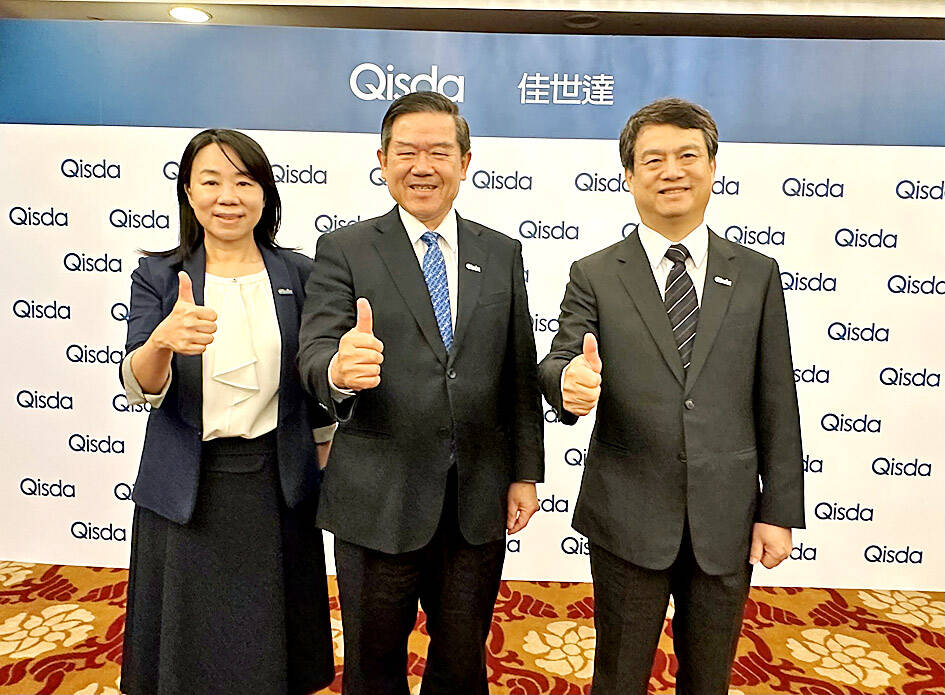Electronics manufacturer Qisda Corp’s (佳世達) operating performance would improve in the second half of this year as orders from customers are forecast to rebound significantly and gross margin is to continue rising, the company said yesterday.
Orders for displays and projectors are expected to gradually pick up in the second half of this year, while demand for networking and communications products, as well as artificial intelligence (AI) of things applications, are also likely to gain stronger momentum in the third and fourth quarters, Qisda said.
The company’s outlook for industrial computers in the second half of this year is also more optimistic after inventories return to healthy levels, it said.

Photo: Chen Mei-ying, Taipei Times
As a result, the company expects operations in the second quarter to be slightly better than the first, when the industry entered a low season.
It also projects revenue performance in the third and fourth quarters to follow the usual strong pattern, Qisda said in a statement released following its annual general meeting.
Regarding demand in various markets, recovery in China and Europe is lower than expected, while order momentum in Taiwan, the US and Southeast Asia is relatively strong, the company said.
Gross margin, a key profitability gauge, declined for two consecutive quarters to 16.01 percent in the January-to-March quarter, but Qisda chairman Peter Chen (陳其宏) said the figure would gradually rise in the following quarters, citing contributions from high value-added products and services.
High valued-added businesses — hospital operations, medical products, smart-business solutions, and networking and communications products — accounted for 40 percent of the company’s overall revenue in the first quarter, while the information technology business, mainly displays and projectors, contributed 47 percent to the total, company data showed.
Qisda’s consolidated revenue in the first quarter decreased 7.41 percent quarter-on-quarter and was down 7 percent year-on-year to NT$46.91 billion (US$1.45 billion).
Net profit fell 39.67 percent quarterly and was down 20.68 percent annually to NT$257 million, which translated into earnings per share of NT$0.13, the lowest since the first quarter of 2020 when the figure was NT$0.12, company data showed.
The revenue contribution from high valued-added businesses to the company’s total has increased from 12 percent in 2013 after 10 years of business transformation, which has also helped lift the company’s gross margin by nearly 6 percentage points over a decade, Chen said.
“Qisda will continue to accelerate investment in new businesses such as medical care and AI smart solutions to create long-term benefits for the group,” he said in the statement.
Shareholders yesterday approved the company’s proposed distribution of a cash dividend of NT$1.2 per share, representing a payout ratio of nearly 80 percent based on last year’s earnings per share of NT$1.51.

When an apartment comes up for rent in Germany’s big cities, hundreds of prospective tenants often queue down the street to view it, but the acute shortage of affordable housing is getting scant attention ahead of today’s snap general election. “Housing is one of the main problems for people, but nobody talks about it, nobody takes it seriously,” said Andreas Ibel, president of Build Europe, an association representing housing developers. Migration and the sluggish economy top the list of voters’ concerns, but analysts say housing policy fails to break through as returns on investment take time to register, making the

‘SILVER LINING’: Although the news caused TSMC to fall on the local market, an analyst said that as tariffs are not set to go into effect until April, there is still time for negotiations US President Donald Trump on Tuesday said that he would likely impose tariffs on semiconductor, automobile and pharmaceutical imports of about 25 percent, with an announcement coming as soon as April 2 in a move that would represent a dramatic widening of the US leader’s trade war. “I probably will tell you that on April 2, but it’ll be in the neighborhood of 25 percent,” Trump told reporters at his Mar-a-Lago club when asked about his plan for auto tariffs. Asked about similar levies on pharmaceutical drugs and semiconductors, the president said that “it’ll be 25 percent and higher, and it’ll

NOT TO WORRY: Some people are concerned funds might continue moving out of the country, but the central bank said financial account outflows are not unusual in Taiwan Taiwan’s outbound investments hit a new high last year due to investments made by contract chipmaker Taiwan Semiconductor Manufacturing Co (TSMC, 台積電) and other major manufacturers to boost global expansion, the central bank said on Thursday. The net increase in outbound investments last year reached a record US$21.05 billion, while the net increase in outbound investments by Taiwanese residents reached a record US$31.98 billion, central bank data showed. Chen Fei-wen (陳斐紋), deputy director of the central bank’s Department of Economic Research, said the increase was largely due to TSMC’s efforts to expand production in the US and Japan. Investments by Vanguard International

WARNING SHOT: The US president has threatened to impose 25 percent tariffs on all imported vehicles, and similar or higher duties on pharmaceuticals and semiconductors US President Donald Trump on Wednesday suggested that a trade deal with China was “possible” — a key target in the US leader’s tariffs policy. The US in 2020 had already agreed to “a great trade deal with China” and a new deal was “possible,” Trump said. Trump said he expected Chinese President Xi Jinping (習近平) to visit the US, without giving a timeline for his trip. Trump also said that he was talking to China about TikTok, as the US seeks to broker a sale of the popular app owned by Chinese firm ByteDance Ltd (字節跳動). Trump last week said that he had